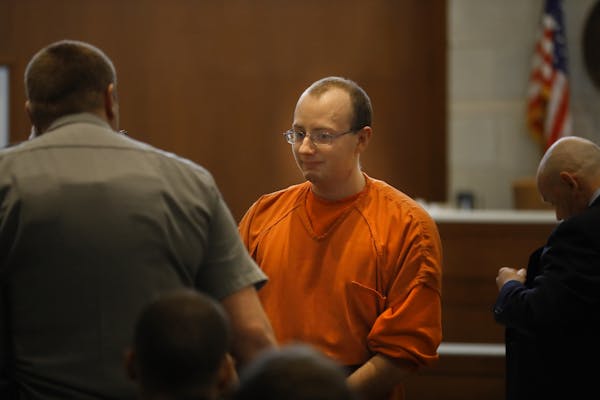BARRON, WIS. – The jubilation that accompanied Jayme Closs' escape after 88 days in captivity has largely faded now, replaced by a deep anger toward her accused kidnapper and a fervent wish for the case to be over.
"We want it to end," Patty Borgen said Tuesday as she sipped a drink with friends at a local pub.
It's a sentiment echoed by many in this small Wisconsin town, about 90 miles northeast of the Twin Cities.
As 21-year-old Jake Patterson heads to court here Wednesday, many hope that he delivers on his words in a recent letter to a Twin Cities TV station — that he plans to plead guilty to the brutal crimes to spare Jayme, her family and the community of 3,400 residents the pain of reliving Oct. 15 during a drawn-out trial.
Patterson's hearing is scheduled for 1 p.m. in Barron County Circuit Court.
"He took something from this community that didn't belong to him," Denise Grueneberg said Tuesday. "And it had a ripple effect through the whole community."
Patterson is accused of breaking into the Closs home in the early morning hours and killing Jayme's parents, James and Denise Closs, with blasts from a shotgun.
He then threw Jayme in the trunk of a car, according to police, and drove about 70 miles north to his family's remote cabin in Gordon, Wis.
There, he kept Jayme, 13, imprisoned under a bed for nearly three months. She finally broke free after he left her alone on the afternoon of Jan. 10 and she stumbled upon a neighbor walking her dog, who helped alert police.
Patterson was arrested within minutes, and later confessed to the killings and kidnapping, according to court documents.
Patterson's attorneys have not commented on how he will plead. But in a letter to a KARE 11 reporter earlier this month, he said he had "huge amounts" of remorse for the crimes he allegedly committed and intends to plead guilty at Wednesday's hearing.
Patterson wrote that he didn't want Jayme's family "to worry about a trial."
His attorneys, Charles Glynn and Richard Jones, have probably advised him against pleading guilty, said Keith Findley, an associate professor at the University of Wisconsin Law School and a former defense attorney.
"It's highly unusual for anyone to plead guilty at an arraignment," Findley said.
"There's plenty of time after this to enter into negotiations and decide what's next," he added. "Examine evidence, talk to the prosecutors, and then you can schedule a plea hearing."
Even if Patterson were to plead guilty, he could withdraw his plea at any time before sentencing, said Daniel Blinka, a professor at Marquette University Law School and a former prosecutor.
"The guy has written these letters and made other public pronouncements," Blinka said. "None of that binds him in any way.
"This guy is manipulative."
A sensitive case
Blinka said defense attorneys likely haven't had a chance to review the investigative material from prosecutors.
"I'm sure his lawyers have advised him that, in addition to the mountains of evidence the prosecution has, they will also introduce your written statements and oral statements into evidence," he said.
Under Wisconsin law, Findley said, a convicted criminal has until 20 days after sentencing to file an appeal.
If no appeal is filed, the case is considered closed and the case records become eligible for public release.
However, Findley said, the law allows for some exceptions, and in a case as sensitive as this, authorities could determine that Jayme's privacy rights outweigh the public's right to know all the details.
Since no charges have been filed against Patterson in Douglas County, where Jayme was allegedly held, it's not known what happened there.
Blinka praised the "professionalism" of prosecutors for holding off on filing additional charges. For instance, Jayme told authorities in Barron County that Patterson once hit her with an object while she was held captive in the cabin.
"Another prosecutor could have chosen to grandstand [by filing charges]," Blinka said. "It's a very responsible decision not to subject Jayme to testifying unless there's a compelling reason to do so.
"But those two murder charges, if convicted, would presumably keep him in prison for the rest of his life."

Former Gov. Jesse Ventura boasts he could beat unpopular Trump or Biden if he ran for president

Dave Kleis says he won't run for sixth term as St. Cloud mayor
Newspaper boxes repurposed as 'Save a Life' naloxone dispensaries

St. Cloud house vies for Ugliest House in America

